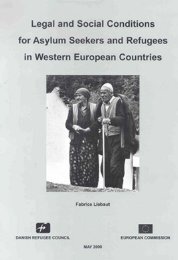Bulgaria - The social impact of seasonal migration
Bulgaria - The social impact of seasonal migration
Bulgaria - The social impact of seasonal migration
You also want an ePaper? Increase the reach of your titles
YUMPU automatically turns print PDFs into web optimized ePapers that Google loves.
6<br />
greater attractiveness as a final destination country manifested in the last years, and<br />
especially after the start <strong>of</strong> the EU accession negotiations in 1999. <strong>The</strong> National Police<br />
data clearly show that there is a tendency <strong>of</strong> increasing the number <strong>of</strong> foreign citizens<br />
staying legally in <strong>Bulgaria</strong> with permanent and long-term residence permits.<br />
Structurally, there are no major changes in the countries <strong>of</strong> origin <strong>of</strong> the permanent and<br />
long-term residents in <strong>Bulgaria</strong> in the last couple <strong>of</strong> years. One <strong>of</strong> the most significant<br />
tendencies is the decreasing number <strong>of</strong> citizens from CIS countries and the increasing<br />
number <strong>of</strong> Russian citizens, although the total number <strong>of</strong> CIS and Russian citizens<br />
remains stable.<br />
<strong>The</strong> traffic <strong>of</strong> foreigners to and through <strong>Bulgaria</strong> becomes more complex and better<br />
organised. Changes in legislation in 2001-2, improvement <strong>of</strong> the administrative capacity<br />
<strong>of</strong> the specialised border police institutions and the tightened and more effective<br />
control on the <strong>Bulgaria</strong>n borders led to restructuring <strong>of</strong> the channels for illegal<br />
im<strong>migration</strong> to the EU countries. <strong>The</strong> chief <strong>migration</strong> flows are from Asia and Africa,<br />
namely from Afghanistan, Iraq, Iran, Turkey, Nigeria, Sudan, Ethiopia and Algeria.<br />
Lifting visa restrictions for short-term entry <strong>of</strong> <strong>Bulgaria</strong>n citizens into the Schengen<br />
space in April 2001 resulted in more than 4-fold decrease in the number <strong>of</strong> borderregime<br />
violations committed by <strong>Bulgaria</strong>n citizens.<br />
In 1994, a new category <strong>of</strong> immigrants was introduced into <strong>Bulgaria</strong>n legislation -<br />
refugees and people with humanitarian status <strong>of</strong> different duration, and the first statuses<br />
based on the Decree for Granting and Regulating the Refugee Status were given in 1995.<br />
From 1993 until 1 January 2003, a total <strong>of</strong> 11 253 persons (7 601 men, 1 748 women and<br />
1 904 children) applied for refugee status. <strong>The</strong>y came from 72 states, but most <strong>of</strong> all from<br />
Afghanistan, Iraq, Armenia, Yugoslavia and Iran. Of all the applicants, 1 356 persons<br />
(including 327 children) were granted refugee status according to the Geneva<br />
Convention <strong>of</strong> 1951. 24% <strong>of</strong> them are aged up to 17, and 76% are <strong>of</strong> 18-59 years <strong>of</strong> age.<br />
Humanitarian protection was granted to 2 668, people, <strong>of</strong> whom 595 children and 245<br />
women.<br />
III. <strong>The</strong> main factors for e<strong>migration</strong> are economic - the relatively high level <strong>of</strong><br />
unemployment in <strong>Bulgaria</strong> and the low standard <strong>of</strong> living. In the last two years, the<br />
<strong>of</strong>ficial statistic has registered a relative economic growth, as well as decreasing<br />
unemployment. If this trend continues in the future, it will probably stabilise <strong>migration</strong>,<br />
too. Potential and real migrants are oriented more to <strong>seasonal</strong> <strong>migration</strong>. Signing bilateral<br />
agreements will regulate this process and will prevent irregular <strong>migration</strong> in large numbers.<br />
<strong>The</strong> practice has shown that after the term <strong>of</strong> employment contracts abroad expires, the<br />
<strong>Bulgaria</strong>n workers return to the territory <strong>of</strong> <strong>Bulgaria</strong>.<br />
<strong>The</strong>re is a process <strong>of</strong> strengthening the control over and the struggle against trafficking<br />
in human beings which is another factor that will reduce in the future the illegal<br />
channels <strong>of</strong> e<strong>migration</strong>.<br />
Another important factor for e<strong>migration</strong> is the already created networks <strong>of</strong> relatives and<br />
friends, the diasporas, which will provoke and maintain a relatively stable flow <strong>of</strong>

















